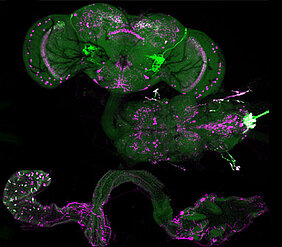An appetite suppressant with side effects
10/04/2016Neurogeneticists from the University of Würzburg have discovered a peptide in Drosophila that has a strong impact on the fly's feeding and sleeping habits. At the same time, it is associated with the insects' circadian clock.

Taking a nap after lunch to digest and relax sounds like a good strategy. However, feeling drowsy after breakfast already would make less sense. Scientists from the University of Würzburg have now identified a peptide that could assume a key role in the complex interactions of hunger, sleep and digestion in the fruit fly Drosophila. The receptors which these peptides act on have closely related counterparts in humans.
Researching genetically modified fruit flies
The peptide is called allatostatin A in scientific speak. "We already knew that allatostatin is produced by both cells in the brain and in the intestine of Drosophila. But we did not know what effects they have there," Professor Christian Wegener describes the starting point of the new study sponsored by the Deutsche Forschungsgemeinschaft (DFG). Wegener is a neurogeneticist at the Department of Neurobiology and Genetics at the University of Würzburg. Together with his PhD student Jiangtian Chen, he investigated which influence the peptide has on the flies' behaviour.
The researchers studied fruit flies that were genetically modified to have only six allatostatin-producing neurons in their brains. Furthermore, these cells were fitted with a kind of temperature-controlled molecular "switch". An ambient temperature above 29 degrees Celsius caused the allatostatin signal to be "switched on" whereas it was "switched off" at lower temperatures.
The study results
The study provided surprising results: when the cells released allatostatin, the fruit flies consumed much less food than insects from the control group. At the same time, they moved much less compared with the non-modified animals. At first, the scientists were uncertain about the cause: "When looking at the insects, it's not evident whether they don't have the energy to walk because they don't eat or whether they are unable to move for other reasons. Also it is unclear whether they are hungry or whether they just don't need so much because they exhibit so little activity," Professor Wegener outlines the dilemma.
Further experiments were required to answer these questions. They demonstrated that fruit flies with activated allatostatin signalling do not seem to be hungry. When the scientists lowered the ambient temperature back to values below 29 degrees – thereby switching peptide release off – the insects did not consume more food than the control group. So they were obviously not ravenous. Their locomotor system, too, worked normally – they exhibited no differences compared to the control group in terms of the speed with which they climbed up a tube.
But there was one distinct difference in the locomotor behaviour: Fruit flies that are temporarily exposed to slight shaking on a kind of "vibrating plate" usually respond with a significant increase in locomotor activity. Insects with a high allatostatin level did not deviate from this behaviour – however only in the morning. At noon and in the evening, their activity patterns were unaffected and the flies remained stationary. This finding put the scientists onto the right track: "If the fruit flies move so little, it might be that they are asleep," Wegener says. They were right: Fruit flies with activated allatostatin A cells sleep during 1,400 minutes of the day's 1,440 minutes.
Surprising link to the circadian clock
Normally, the work of Christian Wegener and Jiangtian Chen would have ended at this point had it not been for the cooperation with Professor Charlotte Förster, Head of the Department of Neurobiology and Genetics, within the DFG Collaborative Research Center 1047 "Insect Timing". An expert in circadian clocks, Förster noticed that the six allatostatin-producing neurons in the brain of Drosophila are located in the direct vicinity of clock neuron terminals. The two researchers acted on her suggestion to take a closer look at this aspect.
What they found was that allatostatin neuron arborisations overlap exactly with clock neuron arborisations, and carry receptors for the neuropeptide PDF which is released by the clock neurons. But the circadian clock's influence at this point is comparably small. "When the PDF receptor is activated, fruit flies will sleep a little longer in the morning and in the evening. This is about the only change we were able to identify," says Christian Wegener. After all, any other findings would have surprised the researchers: "There are many peptides that control the sleeping and feeding behaviour." So it might be that the recently discovered mechanism is not a main path but an ancillary path of sleep control that connects sleeping with feeding habits.
Similarities to human receptor
There is another interesting aspect from a scientific viewpoint: The cells of vertebrates, and hence of humans, do not produce allatostatin. But the receptor on which the peptide acts has a comparable counterpart, namely the galanin receptor. "It controls sleep, eating behaviour and the peristalsis of the digestive system and hence adjusts to the digestion phase," Wegener says. However, it is unknown whether the galanin receptor is also associated with the circadian clock. Further studies are necessary to answer this question.
In the future, Christian Wegener and his team plan to focus on the fruit fly larvae which eat constantly and never sleep. Moreover, the allatostatin-producing cells in the larvae could be switched off selectively in the intestine or the brain, which was impossible in adult flies.
Allatostatin A Signalling in Drosophila Regulates Feeding and Sleep and Is Modulated by PDF. Jiangtian Chen, Wencke Reiher, Christiane Hermann-Luibl, Azza Sellami, Paola Cognigni, Shu Kondo, Charlotte Helfrich-Förster Jan A. Veenstra, Christian Wegener. PLOS Genetics, DOI:10.1371/journal.pgen.1006346
Contact
Prof. Dr. Christian Wegener, +49 931 31-85380, christian.wegener@biozentrum.uni-wuerzburg.de









